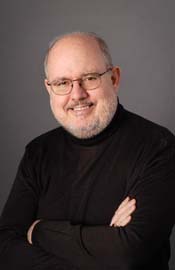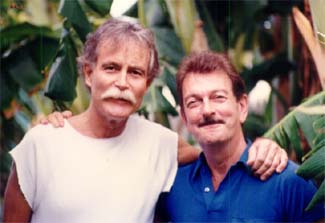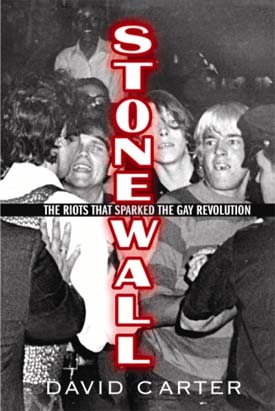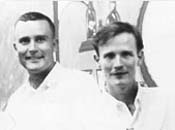
|
|
|
|
History Makers Speak about 1969's Stonewall Riots |
|
"I worked on this book for ten years," David Carter commenced. "I wanted to make sure that my data was accurate. I kept all my cards close to my chest while doing interviews. I never ventured an opinion as to what I thought or what someone else had said. I did that to prevent collaboration. "Sometimes, I felt like I just wanted to burst and share it. It was very difficult at times." Carter continued, sharing his vision that the gay community had "to have a history, part of our identity as a people". He saw the story of the Stonewall riots in "the whole context out of which it came. It was not an isolated event". Marcus stuck to a tight-targeted series of direct questions as he addressed each of the four panelists. "What did the Police think of gay people in the 1960s?" Marcus continued, turning to Seymour Pine, the 85-year-old retired NYC Police inspector who had organized and led the raid on The Stonewall Bar in 1969. Silence engulfed the overwhelmingly gay audience. Many voiced doubts Seymour Pine would actually appear during the pre-panel socializing. They noted that the press release noted: "Although Mr. Pine's participation is expected, it will be dependent on his health. If he is unable to attend, a video interview with him that has been conducted by David Carter will be shown." Inspector Seymour Pine now sat on the platform facing the community which had made him famous/infamous, participating in an affair sponsored by The New-York Historical Society Out Professionals and The Lesbian, Gay, Bisexual & Transgendered Community Center, and an audience composed entirely of older and contemporary gay activists. It was truly a historical moment. "Very prejudiced," Pine responded to Eric Marcus, "The police didn't know what gay people were all about." A barely audible applause rippled across the auditorium. Pine smiled. "I don't know how I would characterize gay people today either." He continued, bringing forth knowing laughter and warmer more-audible applause. "We were not concerned about homosexual people. We were concerned about the Mafia." "Were gay bar raids common?" Marcus queried. "They were very common, " Pine answered directly. "Why?" Marcus quipped. "Laws pertaining to clubs and bars, " Pine explained, " lead to easy arrests. People didn't give you any trouble. And there was always a prejudice. 'We are going down to get the fags'… "Non-uniform officers, those concerned with vice and gambling, were rated on the number of arrests they made." Pine recalled that one day "out of a clear blue sky" he was called into the office of his commanding officer. Interpol said bonds were surfacing on the streets of Europe and wanted to know if they were genuine or counterfeit. Did they come from clubs like the Stonewall?
Leitsch described writing speeches which Hodges gave calling for political activism on the part of Mattachine. He said most of the calls to Mattachine were "desperate calls about entrapment". Marcus turned back to Pine asking about entrapment. "A non-uniform officer's goal was to improve his number. It was so easy to make arrests of gays. They knew where gays gathered. However, they were cruel. They were rough. They mistreated them." "They lied too!" Leitsch interjected. Leitsch described Mattachine's legal arsenal as consisting of three lawyers who specialized in handling entrapment cases. The audience laughed at the number. Leitsch said Mattachine designed and handed out thousands of brochures entitled: "What To Do If You Are Arrested" in areas where gay males cruised. Marcus turned to Thomas Lanigan-Schmidt and asked him to describe the Stonewall Bar and his impressions of it. "I loved it. It was the only bar where you could slow dance." Lanigan-Schmidt observed. "There was one other dance bar, the Tenth of Always, but they kept playing faster music and if you danced too closely, they'd turn on a bright light to stop it. Julius Bar, around the corner from the Stonewall, "was a joke, a puppy place" according to Lanigan-Schmidt whose description produced guffaws from the audience. He mocked "Julius Queens" as pretentious passing-for-straight phonies, the kind that gave homosexuals a bad name, and described them as always defending Julius's as having "fabulous cheeseburgers". The audience shook with laughter. "Stonewall?" Lanigan-Schmidt continued. "I loved the place. At the long bar in front were the johns. The second or back room area had better music, soul." "The first room was more collegiate. The backroom was more a mixture of the homeless, transgendered, etc. I used to slip into the bar without paying so I kept away from the front area and socialized mainly in the rear. Marcus turned back to Pine, asking who owned the Stonewall Bar and why "you decided to organize the raid". Pine said "Fat Tommy" was the nickname of the real owner but that the bar was really part of the turf controlled by a higher up named Mattie. (Pine gave the full names but this reporter could only guess at the spelling.) Pine said the Stonewall consisted of regular patrons but that on weekends, Cadillacs, Lincolns and other luxury cars would arrive with a different class of people who just came to ogle. Pine said the ownership and patrons of Stonewall were "so open about being bad and advertising that they were having same-sex action there" the Police wanted to close them down but really could not "because that was very political." "We knew what was going on at all time." Pine continued. "The place was closely monitored with agents in plain clothes inside. We never knew when we were coming up against someone from another agency…. Pine described being provoked and annoyed because whenever the Stonewall would be raided, those running it would taunt them with the fact "they would be open the next day". Pine said he had organized the raid in late June of 1969 without informing the Sixth Precinct, which he described as having been paid/off and/or bought/off by the bar's owners. On the night of the raid, Pine said he was initially in the small park across the street, now the location of a Gay Civil Rights monument, while two policewomen were inside the bar posing as lesbians and two plainclothesmen were also inside to see "who was doing the selling".
Pine said that normally patrons of gay bars being raided usually lined up and quickly left after showing identification. The officers were mainly interested in "looking for minors because that would be a more serious charge". (Later, Pine told this reporter that drugs were not a real problem at Stonewall, that they sometimes "found a little marijuana" and "simply threw away" any pills that were found.) Transvestites were generally arrested, Pine noted. They were in a different group. Searching them raised questions regarding the gender of the officers searching since no one could be sure which gender was appropriate. (Someone volunteered that, in 1969, it was illegal to appear in a public place without wearing at least three items of dress appropriate for one's biological gender.) On the night of the Stonewall raid, Pine noticed a different response immediately from those inside. "This time, they didn't try to get out. They didn't line up. We usually let most patrons go because it was a lot of paperwork for us." Pine then described conditions slowly spinning out of control. A crowd much larger than that inside the bar had gathered outside. They were angry and violence-prone because a rumor was spreading that police officers were beating up patrons inside the bar. Finally, Pine admitted, he became "very frightened" because after a series of booming sounds outside made by an uprooted parking meter and Molotov cocktails crashing through the windows (easily extinguished, however) larger and larger objects were hurled at the embattled small group of officers. "I had a group of police, armed, guns drawn" Pine continued, detailing the scene. "The crowd outside was growing larger and larger. When you have a gun out and a bottle lands near you, if you react and shoot, you're dead. I was afraid if someone got hit, the reaction would be to pull the trigger." "At one point," author David Carter interjected, "it became total outrage." Carter then played a short interview with Fred Sergeant, Craig Rodwell's lover, which had been broadcast a few days later on WBAI-FMin which he described the event as seen from the outside. After the WBAI-FM tape ended, a member of the audience asked if any lesbians had played a leading role that evening. "It has always been disputed whether a lesbian played a leading role." David Carter explained. He noted finding conclusive evidence in several documents written independently in 1969, two of which were previously unknown. The second half of the program consisted of panelists answering questions posed by members of the audience. Marcus selected randomly from the sea of raised hands. "How did it end?" Someone asked Pine. "I got out as fast as I could." Pine responded, "I never really knew how it ended." He described how he had placed calls for back-up assistance from inside the Stonewall. However, each time, those calls for back up were countermanded. Finally, one of the policewomen crawled out through a vent in the rear of the bar, went to a nearby firehouse on West 10th Street and managed to convince those higher-up in the Police Department that assistance was really needed. Pine described two wagons and a police cruiser finally arriving as the initial back up: "One they came, the crowd tripled." Pine grew more cautious when pressed as to "why" back up had been so slow in arriving and as to who countermanded his initial calls for back up and help. "The Sixth precinct was angry because we hadn't told them we were planning a raid that night," Pine noted. "The Sixth precinct wasn't very successful in keeping these bars controlled". "Do you think it was the Sixth Precinct that was countermanding those calls?" David Carter pressed sharply. "We suspected that but never could find out who countermanded that order." Pine replied. Dick Leitsch said he suddenly found himself in a difficult position during the days that followed. He said the Mayor's office was asking him "to stop the riots". Meanwhile, half the gay community was urging that he and others "burn something down". It was all, in his words, "total chaos". "Craig Scoonmaker wanted to agitate for a gay homeland," Leitsch recalled humorously. "I told him,' we have one already. It's called Cherry Grove.'". Leitsch also insisted Mattachine had gotten a bum rap, that he and the Mattachine Society "had nothing to do with that sign" which urged homosexuals to be good citizens and obey the law. "On one side of me there was Craig Rodwell demanding I do something to support the riots," Leitsch recalled. "And on the other side, there was Randy Wicker screaming at me, six inches from my face, blaming me for starting the riots."
Those patrons would then be approached later and shaken down for money to keep the matter quiet. Carter's research found that the ring had over 2,000 victims and had taken in as much as two million dollars by targeting those with positions on Wall Street or in Washington. He says he has some evidence that J. Edgar Hoover and Clyde Tolson were among those who used the services of prostitutes and suspects that is the reason Ed Murphy never went to jail for his activities. Toward the end of the questioning, it was obvious Pine had won over most of those attending. "Why did you wait till so late, on Friday, after midnight, to raid the Stonewall?" One member of the audience challenged Pine. "It was not that late. The gay population doesn't come out early." Pine responded. "We would have loved to be home and in bed by ten o'clock". Laughter filled the auditorium. Someone asked Pine about the effect Judy Garland's funeral that day had on the crowd that evening. Pine, obviously enjoying the warm acceptance coming from the audience, responded: "If I had known Judy had died at that point, we wouldn't have had the raid." Another audience member suggested that perhaps Pine had done the gay community "a great service" by raiding the Stonewall that evening. "If what I did helped gay people be free, I'm happy for it." Pine responded, invoking an explosion of warm applause. The 'legendary villain' of the Stonewall story had, like a real life Cinderella (despite the cane leaning on the wall behind him) had stepped forward and totally won over nearly everyone. The moment called to mind the new hit show Wicked which sympathetically explains how OZ's Wicked Witch of the West came to be. David Carter noted that he was "very grateful for Seymour Pine's cooperation with me". However, there were a few angry dissenters. Andy Humm, one of the nation's most prominent gay journalists and commentators, reacted angrily toward both Pine and the audience's obvious response. "What about all the lives you ruined?" Humm shouted furiously, provoking only a smattering of support from those present. Pine complimented David Carter's book Stonewall: The Riots That Sparked the Gay Revolution, saying that "it got the facts correct which none of the others books have managed to do". After the program ended, a huge line formed to purchase David Carter's book and lined up to have their copy autographed in the New-York Historical Society bookshop. In the auditorium itself, dozens more lined up at the end of the stage where Seymour Pine was seated. They wanted his autograph as well. They wanted to thank their old enemy and make amends. |
 Author David Carter's book Stonewall: The Riots That Sparked the Gay Revolution was the focus of a panel discussion including Carter and individuals involved in the 1969 Stonewall Rebellion
Author David Carter's book Stonewall: The Riots That Sparked the Gay Revolution was the focus of a panel discussion including Carter and individuals involved in the 1969 Stonewall Rebellion  Dick Leitch (right) and GayToday's Editor Jack Nichols
Dick Leitch (right) and GayToday's Editor Jack Nichols  David Carter's Stonewall: The Riots That Sparked the Gay Revolution,
David Carter's Stonewall: The Riots That Sparked the Gay Revolution,  Gay media whiz kid Randolfe H. Wicker (right) and GayToday editor Jack Nichols visit Coney Island in 1964
Gay media whiz kid Randolfe H. Wicker (right) and GayToday editor Jack Nichols visit Coney Island in 1964